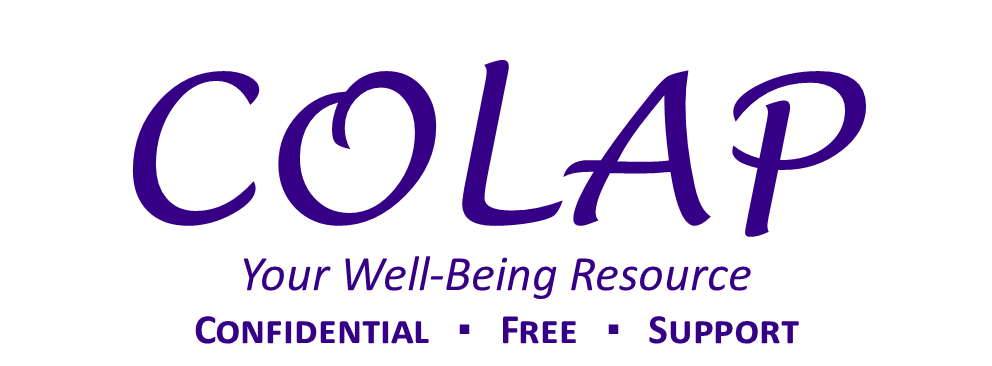The Sandwich Generation

Colorado Lawyer Assistance Program
2490 West 26th Avenue
Denver, CO 80211
303-986-3345
www.coloradolap.org
"How can I go forward when I don’t know which way I’m facing?” ~John Lennon
Are you caring for elderly parents and raising children? If so, you are part of the “sandwich generation,” and the following scenario probably sounds familiar. Even if you aren’t part of the sandwich generation, parts of this might ring true for you:
“I was late for court again this week, but I had to help my mother because her dementia is getting worse and she is forgetting to take her medication. Hours after I checked on her, my son’s school called because he is behind on his homework in four subjects and might face academic suspension. On top of all of this, my spouse is out of town traveling for work, our house is a mess, and I feel I’m behind in everything and don’t have the energy to catch-up. Life feels like a giant to-do list, and every time I scratch off one completed task, five get added to the list. Fun? I don’t know what that is anymore.” ~Anonymous
It is estimated that 25% of adults with children under the age of 18 are also responsible for elder care. For judges and magistrates who are members of the sandwich generation, it can feel like you are helping people 24/7. This often results in feeling constantly overwhelmed, exhausted, ignored because your needs aren’t considered, fearful or anxious, stressed, even angry or resentful, or being physically ill (colds, digestive issues, etc.). For all of you, but particularly the sandwich generation, self-care is not a luxury: it is a necessity. Some quick tips for taking care of yourself when you feel pulled in ten different directions at once include:
1. Learn to ask for help, and say “yes” when someone offers assistance. Think of those common sayings, “No man is an island” and “It takes a village.” Being a caretaker, a parent, and a judge/magistrate are all full-time jobs; when we are doing all three at once, no man or woman can do it alone. But when we are perpetually giving of ourselves (time, attention, mental and emotional energy), the momentum is like a freight train, and it’s hard to slow down enough to even consider how to ask for help, or notice when other people are offering assistance. Remember that people feel good about helping others, and it is not being self-indulgent or a sign of weakness if you accept it. Rather, you are giving someone else the opportunity to feel useful and helpful.
2. Schedule time for yourself. If you don’t schedule time for yourself, someone or something else will fill that time. Because socializing with peers becomes especially difficult for the sandwich generation, scheduling coffee, lunch, or taking a walk with a peer in advance can be a metaphoric life-saver for your psychological health and well-being. You can also schedule time for yourself; time to go shopping just for you, time to read that book you’ve been looking forward to, or to see a movie by yourself. When you spend the majority of your mental and emotional attention on others, your brains and your bodies tend to rebel; you get sick, resentful, irritable, or angry. Scheduling time to focus your mental and emotional energy on yourself, even just for small portions of time throughout the week, is a form of preventive care that will help you avoid compassion fatigue and burnout.
3. Remind yourself that not everything is a crisis. When you are in “go-go-go” mode, your nervous systems start behaving as if you are under perpetual threat; as if we were in a war zone. Ironically, you become less capable of responding rationally and intelligently to actual emergencies when you tax your nervous system over time. Remind yourself that the situations or needs that arise for those around you might be worthy of your time and attention, but they are usually NOT true emergencies. When situations arise that need your attention, mentally pause and metaphorically “step back” from the situation by giving yourself a few moments, take a deep breath (or two), and assess whether this is truly a crisis. If it is, taking a few moments to gather your wits will help you make good decisions; if is not a true emergency, intentionally and mindfully respond to the situation or the person from a calm, centered place.
One of most important things to remember is to be gentle with yourself, which is not usually the way judges and magistrates respond to stress and pressure. It takes extra effort for us to ignore the perfectionistic voice inside our heads, or the demanding voice that comes from litigants, lawyers, spouse, children, or parents. When you wake up every morning, and before you go to bed every night, remind yourself that things are not as bad as they may seem, and that you have the strength to handle whatever is coming your way because you will take time to take care of yourself, and you are doing the best you can. You are not alone in feeling the pressures of being a 24/7 caretaker, helper, and problem solver. If you could use more tips on how to handle the stress, you can call your confidential Colorado Lawyer Assistance Program.
By Sarah Myers, JD, LMFT, LAC
Executive Director, Colorado Lawyer Assistance Program
© Colorado Lawyer Assistance Program, 2020
The Colorado Lawyer Assistance Program (COLAP), your free, confidential and independent well-being program for Colorado judicial officers, is available at www.coloradolap.org or by calling 303-986-3345. If you or a colleague are in need of confidential support, referrals, direction on how to resolve personal or professional stressors, or are interested in a free well-being consultation, please contact COLAP directly for assistance.